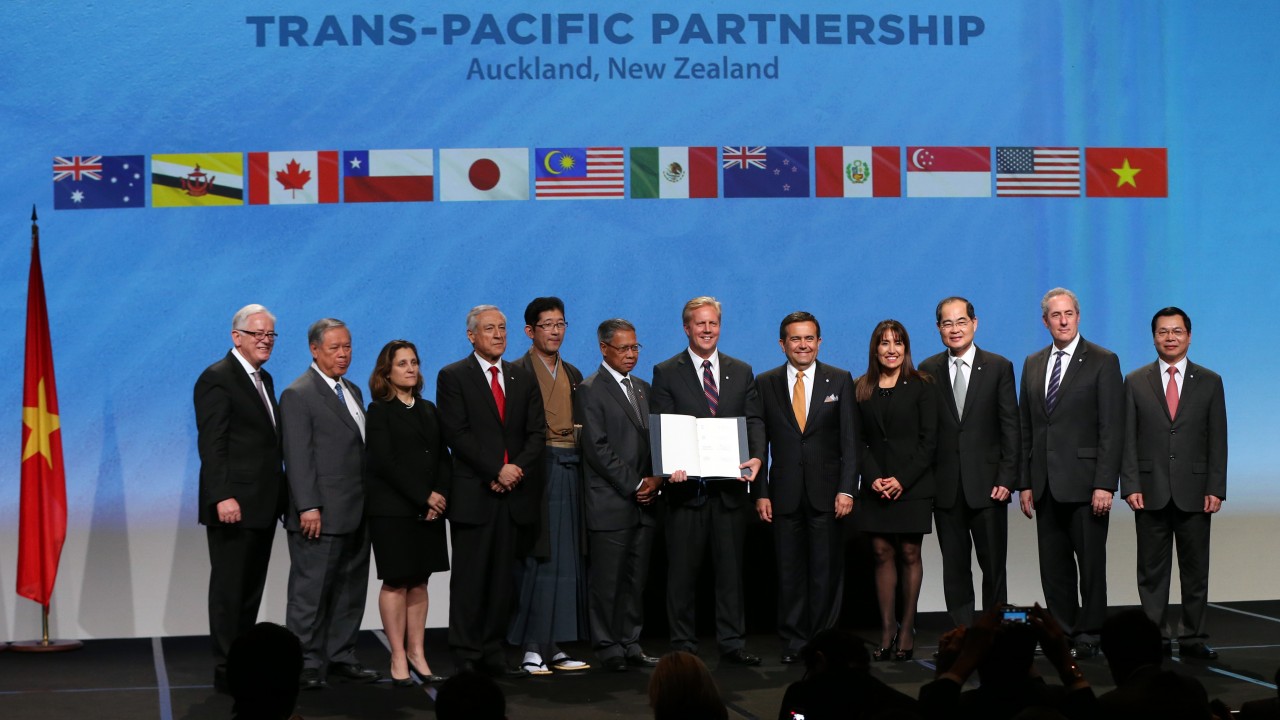
Representatives from 12 countries pose for a photo after signing the Trans-Pacific Partnership agreement in Auckland, New Zealand, on February 4, 2016. (MICHAEL BRADLEY/AFP/Getty Images)
This post originally appeared at The Progressive.
It must have given the earnest wonks at the Economic Policy Institute a bit of a start when Donald Trump touted their research in a speech courting white working-class voters by criticizing NAFTA and US trade policy with China.
EPI president Lawrence Mishel was moved to respond in a blog post tilted “Trump’s Trade Scam.”
“If he is so keen to help working people, why does he then steer the discussion back toward the traditional corporate agenda of tax cuts for corporations and the rich?” Mishel wrote, hastening to distance himself from Trump.
— Tarso Luís Ramos, Political Research Associates
Progressives who have long criticized trade deals that favor multinational corporations, suppress wages, accelerate outsourcing and replace local democracy with unelected tribunals shrink from keeping company with the racist, isolationist right.
This is equally true in Trump’s America and in Britain, newly divorced from the rest of Europe. Guardian columnist Gary Younge concurs with Mishel on the fraudulence of rightwing anti-globalism, and particularly the immigrant-bashing Brexit campaign:
“The very people who are slashing resources — the Tory right — and diverting what’s left to the wealthy are the ones rallying the poor by blaming migrants for the lack of resources,” Younge wrote.
Not content with urinating on our leg and telling us it’s raining, they have found someone to blame for the weather.
Right-wing populists are making a lot of noise about the weather lately — that is, the lousy economic climate brought on by trade deals that favor corporations at the expense of labor. As a result they are making inroads with an anxious working class.
“Progressives can’t afford to cede economic populism to the man who could prove to be the most effective white nationalist campaigner of our generation,” Tarso Luís Ramos, executive director of the right-wing watchdog group Political Research Associates put it to me recently, when I interviewed him about Donald Trump.
To get a progressive view on globalization, I spoke with Melinda St. Louis, International Campaigns Director for Public Citizens’ Global Trade Watch. St. Louis has spent her career working on fair trade.
She is optimistic about a global movement for economic justice.
“I don’t think we’re ceding talking points on this,” she says, pointing to the campaign to defeat the Trans Pacific Partnership (TPP), which she calls “kind of exciting.”
For years, both major parties pushed multinational corporations’ agenda in big trade deals. But not this year. Growing public ire over NAFTA, especially in the Rust Belt, which has seen more than 57,000 factories offshored, has changed the political debate. St. Louis points out:
Now the candidates are fighting over who hates the TPP more. That is a prudent response since all of the trade unions, environmental groups, LGBT organizations, women, retirees — the entire progressive base is opposing TPP.
It’s not about trade or not trade, it’s about who writes the rules and who benefits.
Human-rights advocates see no reason for the TPP to make it easier for Malaysia, which has a problem with human trafficking, to access US markets. LGBT activists don’t want to roll out the red carpet for Brunei, which is bad on LGBT rights.
Overall, the trouble with the TPP is that it “doesn’t learn the lessons of NAFTA,” St. Louis says. “It expands incentives for offshoring and creates more opportunities to challenge environmental and health and safety laws through secret tribunals.”
The public is increasingly unhappy with such deals.
St. Louis notes the TransCanada corporation’s recent Keystone claim against the United States under NAFTA’s rules. “Obama listened to activists, who pointed to the environmental and economic damage, and now we the taxpayers could be on the hook for $15 billion because of an unaccountable trade deal. Why on earth would we want to expand that through the TPP?”
Perhaps the biggest difference between left- and right-wing views of global trade is that while right-wing populists blame immigrants and foreign workers, progressives see workers across borders making common cause.
“I worked in Central America during the Central America Free Trade Agreement negotiations, and the people in Central America said at the time, ‘This is going to decimate us,’” says St. Louis. “Sure enough, we’ve seen an increase in inequality and instability in the region since CAFTA passed.”
St. Louis speaks with feeling about “the brightest, most entrepreneurial people” leaving Southern Mexico and Central America to make the dangerous trek North, not because they think the streets in the United States are paved with gold, but because there are no other opportunities for them:
To see these families in a place where family is so important being broken up for years — parents sending money to their children, but not seeing them for 15 years — it’s devastating.
Scapegoating these immigrants is particularly outrageous, she says, since economic and trade policies have been a major contributor to their plight.
Take the 2 million Mexican farmers who lost their livelihoods under NAFTA when US-subsidized corn flooded the market at prices that were lower than the cost of production.
Despite the bad economic news, and the ominous rightwing backlash, St. Louis is optimistic about the global movement for economic justice:
When there is this level of overreach of corporate greed people do mobilize and beat it back. A couple of years ago it was unthinkable that the TPP would be a major issue in the presidential campaign.
There have been other victories. Massive opposition to the Free Trade Area of the Americas — a proposed NAFTA expansion — killed that plan. Likewise, citizen organizing helped kill the Multilateral Agreement on Investments.
Liberal economists, including Paul Krugman, Larry Summers and Robert Reich, have moved away from their pro-NAFTA positions and begun to support the call for fair trade. St. Louis sums it up:
There is a populist response from the left and the right. Elites should pay attention.




